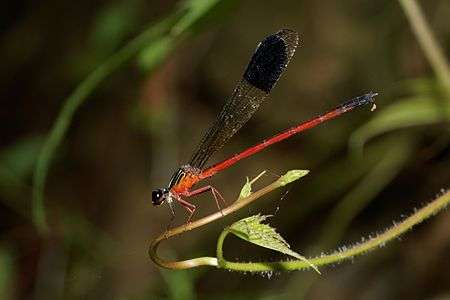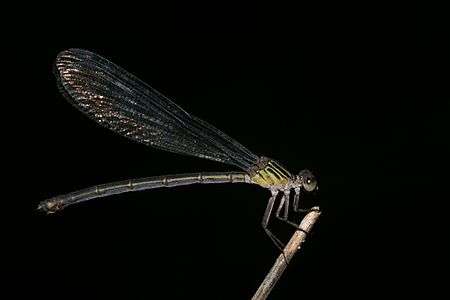Euphaea fraseri
Euphaea fraseri,[2][1] Malabar torrent dart,[3][4] is a species of damselfly in the family Euphaeidae.[1] This species is endemic to the Western Ghats; known to occur in various locations up to Goa.[5][1][6]
| Euphaea fraseri | |
|---|---|
 | |
| Male | |
 | |
| Female | |
| Scientific classification | |
| Kingdom: | |
| Phylum: | |
| Class: | |
| Order: | |
| Suborder: | |
| Family: | |
| Genus: | Euphaea |
| Species: | E. fraseri |
| Binomial name | |
| Euphaea fraseri (Laidlaw,1920) | |
| Synonyms | |
| |
Description and habitat
It is a medium sized damselfly with black head and brown-capped pale grey eyes. Its thorax is black, marked with sky-blue antehumeral and reddish-yellow humeral stripes. Lateral sides of the thorax in the base is red. Legs are red as in Euphaea cardinalis; but first pair is dark. Wings are narrower than Euphaea cardinalis; hind-wings are shorter than fore-wings. Fore-wings are transparent, merely enfumed with brown on the apices. Hind-wings are transparent; but one third of the wings from the apices are broadly black. Abdomen is bright red up to the segment 7; apical third of segment 7 to the end segment are black. Anal appendages are black.[5]
Female is short and robust; the ochreous-red of male is replaced with yellow colors. All wings are transparent, enfumed with black in adults. Abdomen is black with yellow lateral stripes up to segemnt 6. The yellow lateral stripes continued to segment 7. Segment 8 has a narrow and 9 has a broad yellow apical annule, covering dorsal half.[5]
They breed in hill streams but at a lower elevation. Males usually found on low herbage along the banks or middle of the streams.[5][7][8][3][4]
See also
- List of odonates of India
- List of odonata of Kerala
References
- Kakkasery, F. (2011). "Euphaea fraseri". IUCN Red List of Threatened Species. 2011: e.T175169A7116539.
- Martin Schorr; Dennis Paulson. "World Odonata List". University of Puget Sound. Retrieved 12 Oct 2018.
- "Euphaea fraseri Laidlaw, 1920". India Biodiversity Portal. Retrieved 2017-03-07.
- "Euphaea fraseri Laidlaw, 1920". Odonata of India, v. 1.00. Indian Foundation for Butterflies. Retrieved 2017-03-07.
- C FC Lt. Fraser (1934). The Fauna of British India, including Ceylon and Burma, Odonata Vol. II. Red Lion Court, Fleet Street, London: Taylor and Francis. pp. 110-112.
- K.A., Subramanian; K.G., Emiliyamma; R., Babu; C., Radhakrishnan; S.S., Talmale (2018). Atlas of Odonata (Insecta) of the Western Ghats, India. Zoological Survey of India. pp. 88–89. ISBN 9788181714954.
- C FC Lt. Fraser (1924). A Survey of the Odonate (Dragonfly) Fauna of Western India and Descriptions of Thirty New Species (PDF). p. 480.
- Subramanian, K. A. (2005). Dragonflies and Damselflies of Peninsular India - A Field Guide.
External links
![]()
![]()
